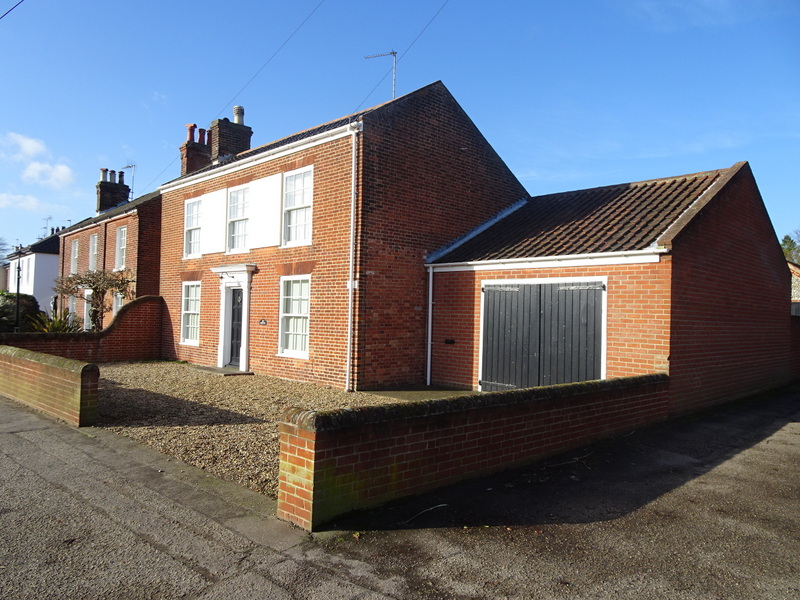Star Inn, Repps Road, Martham
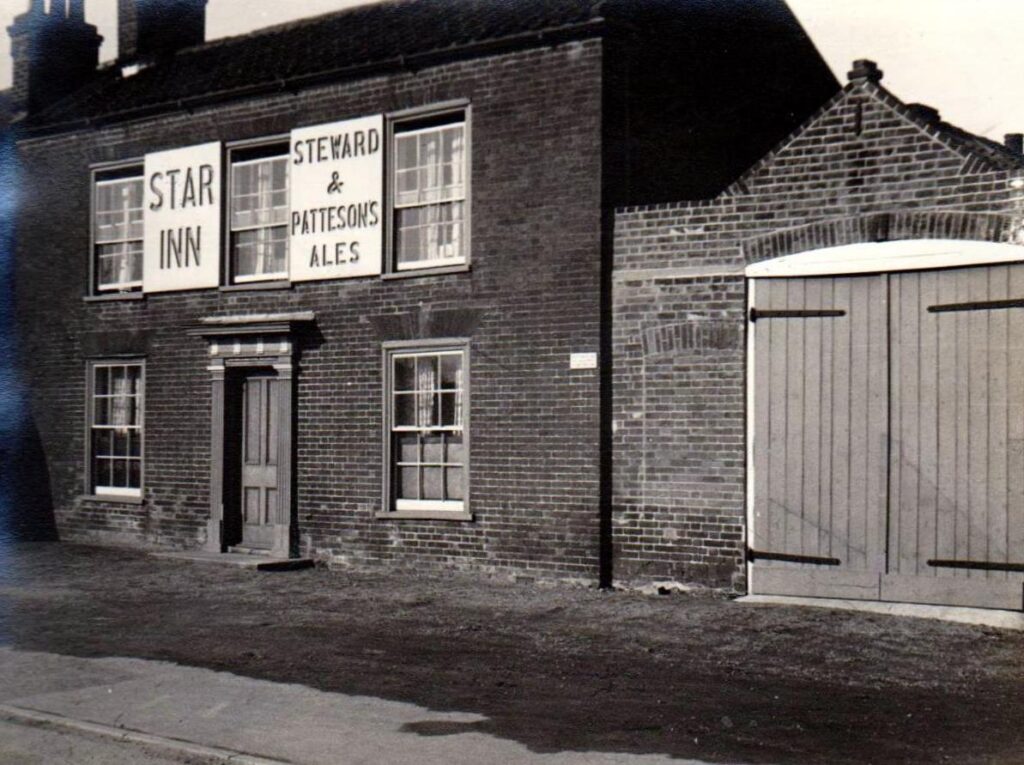
The Star Inn (or Tavern) stood in Repps Road from around 1850 until it closed on 30th September 1965 and was converted into a residential home which is now No24 Repps Road. When it was opened it was probably more of a beer house than a full public house. It was located next to the original village Post Office and was said to be damaged by enemy action during WWII. It sold 65 barrels of beer in its final year of trading. Next to the Star is a small Loke with some houses that were once called Bottle Hall Cottages which presumably earned that name because they were part of the workings of the Star or the Victoria Inn. Click on Bottle Hall to read more about the cottages.
Beer houses were created by the 1830 Beer Act, when the government tried to create a free market in beer. Before that fully licensed pubs were regulated by local magistrates, who had wide-ranging powers to grant and revoke licences. Beer houses, on the other hand, were controlled by the Excise Department. As long as a few basic conditions were met, beer house licences were granted automatically. Unsurprisingly, the number of pubs rocketed after 1830. Many beer houses literally consisted of just a room or two in a house and could start up in business without being subject to local control by magistrates.
In 1869, control of beer house licensing was given back to local magistrates, who set about closing as many as they could. This aggressive policy of reducing the number of licences spurred the growth of the tied public house. The Star became tied to the brewers Steward and Patteson*. Many beer houses were closed because of their poor facilities-some even lacked toilets. The lucky ones, like the Star, had their licences upgraded which was a real bonanza for the owner since a fully licensed pub was worth four or five times as much as a beer house.
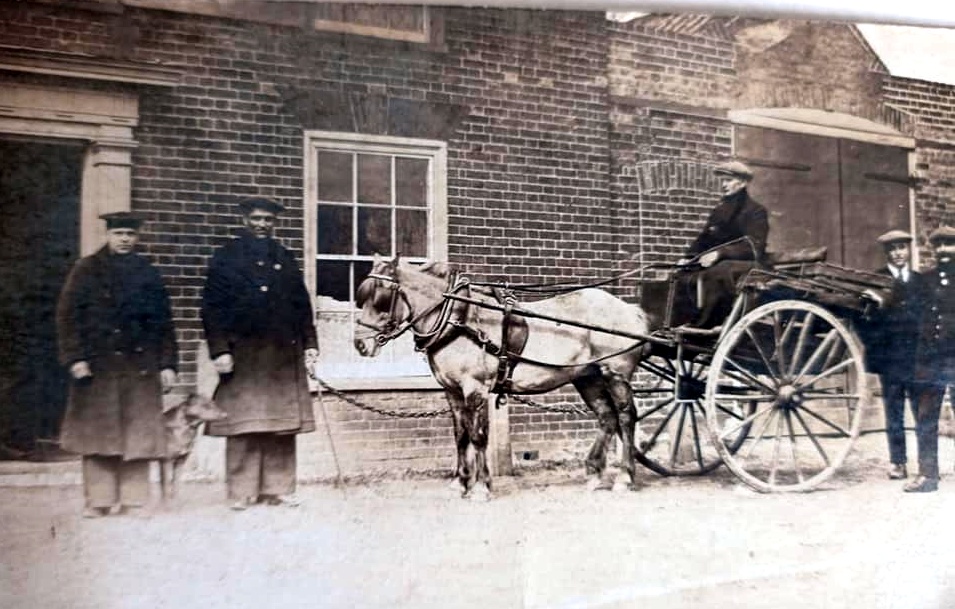
The exact date the pub opened is not known but is indicated by the list of licensees below. The building is not shown on the 1842 Martham Tithe Award map so it must have been built sometime between then and 1850.
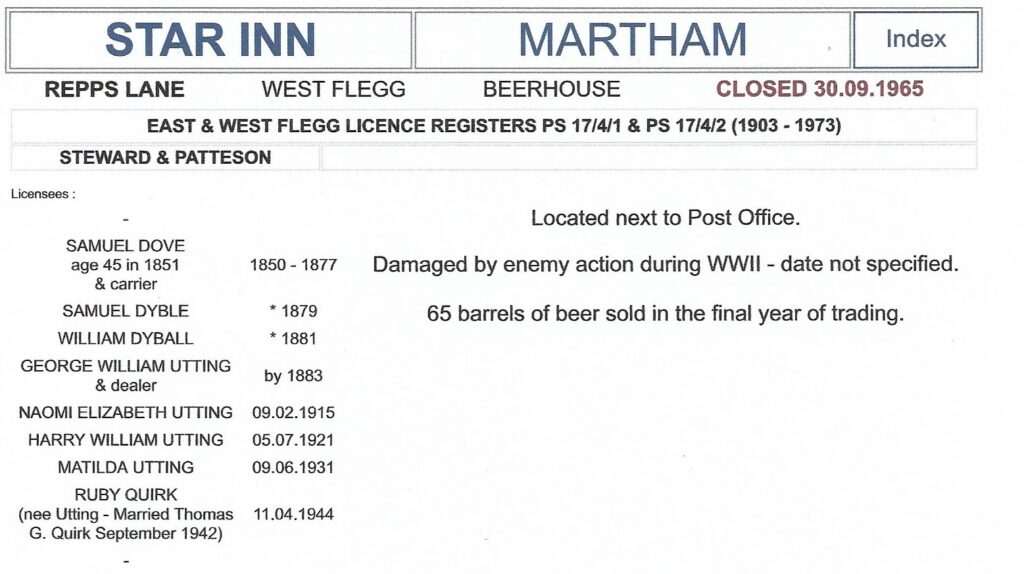
The earliest known publican from 1850 to 1879 was Samuel Dove who was born on 10th September 1806 at Witton, Ridlington, Norfolk. His parents were Samuel Dove & Mary, nee Walpole. He was married to Mary Ann Emms and they had three children between 1834 and 1845
Samuel was listed as being at the Star with his family in the 1851, 1861 and 1871 census returns which showed that he was also a licensed carrier providing a regular service delivering goods between local towns and villages.
Samuel was also listed in various business directories during his time at the pub as follows:-
1850 – listed in Hunt’s Directory as a beer retailer.
1854 & 1864 – listed in White’s Directory as a beer house keeper.
1869 – listed in the Post Office Directory as a beer retailer and carrier.
1877 – listed in Kelly’s Directory as a beer retailer and carrier at the Star Tavern.
His wife died in 1872 and by 1881 he was living at Black Street, Martham but was still a carrier. He died in March 1885 and like his wife is buried at St Mary’s Church in the village.
In 1879 a bit of confusion sets in because Kelly’s Directory for that year lists a James Dyble as being a beer retailer but the Licensee list has a Samuel Dyble as landlord of the Star. Nothing further is known about either of them.
By the time of the 1881 census things are a little clearer when both the Licensee list and the 1881 census have William Dyble as the landlord. He was born at Ingham in about 1849 and was married to Elizabeth. Their stay at the pub was short lived and was followed by the next set of longer standing publicans.
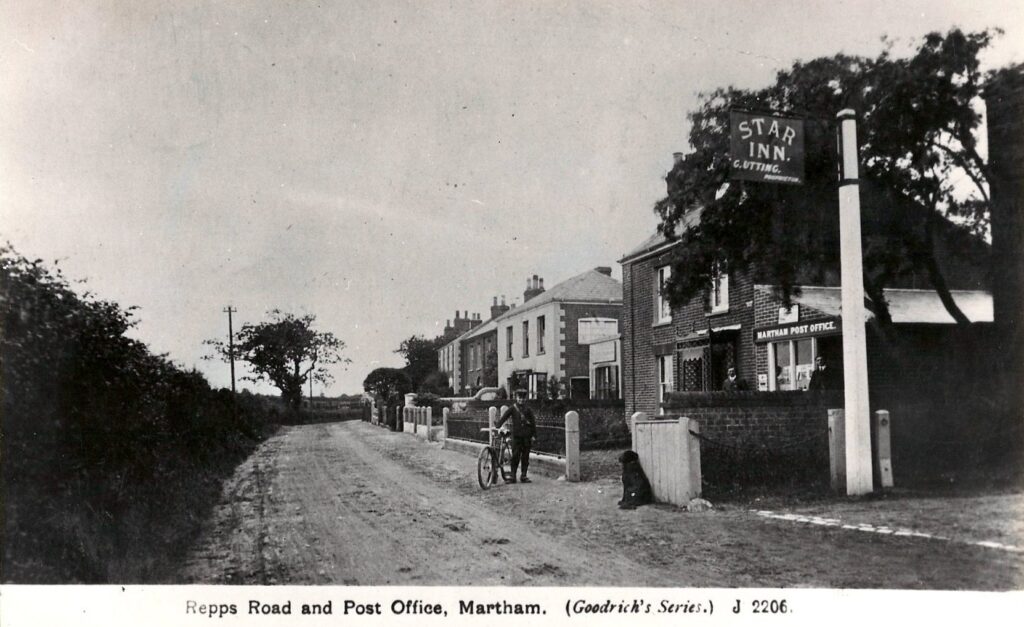
Three generations of the Utting family then looked after the pub. The first was local man George William Utting (1844-1914) who was married to Naomi, nee Thurtle (1845-1931).
George was the landlord and a general dealer from 1883 until 1914 when he died. Naomi took over the pub officially the following year. George & Naomi had seven children, one of whom was a son called Harry William Utting (1881-1931) whose wife was Matilda, nee Pope (1882-1944). Harry was listed as being the landlord from 5th July 1921 until he died in 1931 at which time his wife took over the license. Harry & Matilda had three children one of whom was Ruby (1911-1997). Ruby had married Tomas George Quirk (1911-1978) and Ruby then took on the tenancy of the pub from 11th April 1944. Together they ran the pub until it closed in 1965 after which they still lived there. Tom died at the pub in 1978 and Ruby died in 1997. They both share a grave at St Mary’s.
George Utting was listed in Kelly’s Directories of 1883 & 1890 & 1892 & 1896 & 1904 & 1912 as a beer house keeper and dealer. Matilda Utting, nee Pope, was listed as being at the Star Inn in 1937 according to Kelly’s Directory.
The Inn finally closed on 30th September 1965 and was converted into a residential house.
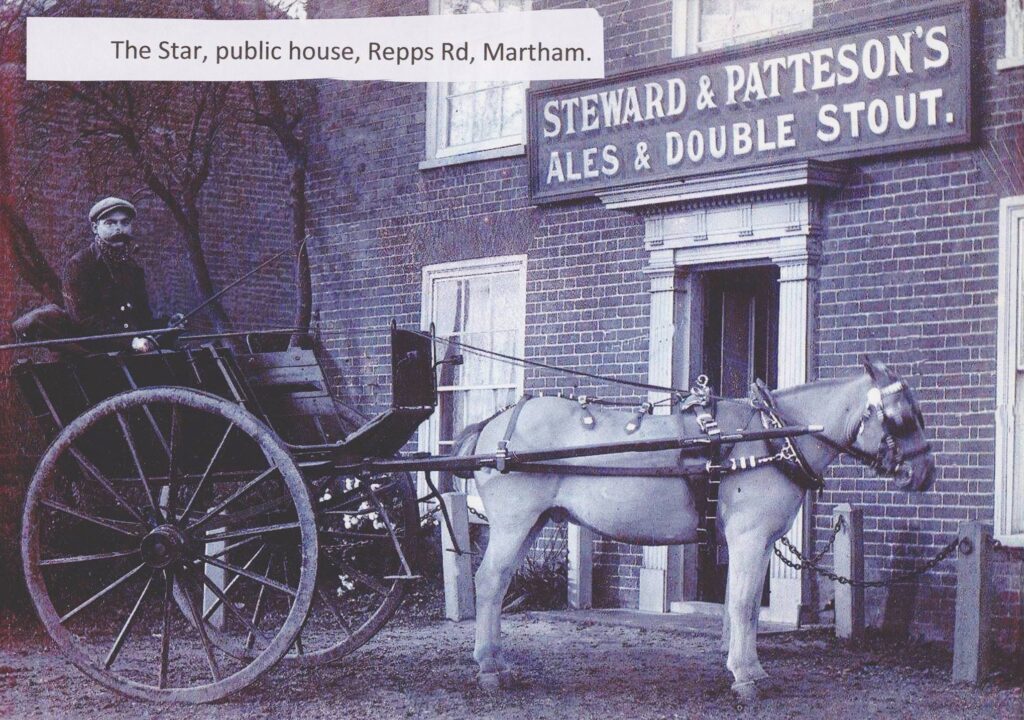
*The Star Inn was a pub tied to Stewart & Patteson brewers that was founded in Norwich. The brewery was founded in 1793 when Charles Greeves sold his brewery to John Patterson. In 1794, John purchased the Great Yarmouth Brewery from William & James Fisher, which included 17 public houses. That same year, he purchased another brewery from James Beevor, and the following year, another from Jehosophat Postle. The public houses owned by John Day also came into his possession.
In 1820, a new partnership of Steward, Patteson & Stewards was formed, consisting of five partners: John Staniforth Patteson, the son of John; William Steward; Ambros Harboard Steward; Timothy Steward Sr. and Timothy Steward Jr.
John Patteson died in 1832, and his son John Staniforth Patteson followed in 1833.
In 1837 the business was merged with the brewery of Peter Finch, the company then became Steward, Patteson, Finch & Co.
In 1840 John Staniforth Pattesons son Henry Staniforth Patteson went into business with George Morse and the Stewards and a new company Steward, Patteson & Stewards and George Morse was formed with an agreement to run for ten years.
By 1901, John Patteson’s great grandson Henry Tywhitt Staniforth Patterson was the director.
The company survived well into the 20th century and by 1961, was described as being one of the largest non-metropolitan breweries in the country.
By the early 1970s, the company had been facing financial difficulties and by 1974 most of the breweries belonging to the company had been demolished.
